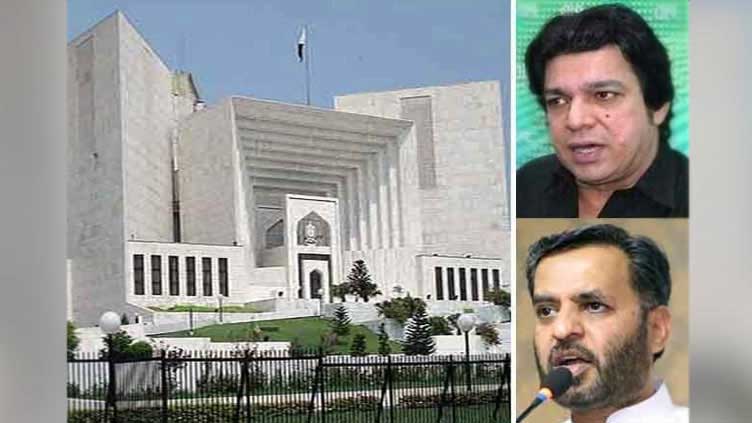Supreme Court accepts Vawda, Kamal's unconditional apologies in contempt case

Pakistan
CJP Isa-led bench withdraws notices against both politicians
ISLAMABAD (Dunya News) – The Supreme Court accepted the unconditional apologies tendered by Senator Faisal Vawda and MQM-P leader Mustafa Kamal in the contempt of court case on Friday.
The court also withdrew the notices served on the two politicians for their verbal onslaught against judges of superior courts.
A three-judge bench of Chief Justice Qazi Faiz Isa, Justice Irfan Saadat and Justice Naeem Afghan presided over the hearing.
At the outset of proceedings, Mustafa Kamal's lawyer Farogh Naseem argued that his client had apologised unconditionally and had now expressed his regret in a press conference.
Chief Justice Isa then asked Faisal Vawda who replied that he had also apologised.
During the previous hearing on May 18, the apex court dismissed Mustafa Kamal's request for immediate pardon.
Last Wednesday, Vawda also tendered an unqualified apology, appealing to the court for withdrawal of the notice against him.
The court took suo motu after Vawda's press conference on May 15, where he indirectly implied that high court judges had vilified the country’s intelligence agencies.
The court initiated suo motu proceedings against Vawda and Kamal on May 18, with CJP Isa directing both to file their responses to the show-cause notices within two weeks.
Also, the PEMRA (Pakistan Electronic Media Regulatory Authority) was ordered to submit the video recording and transcript of Vawda’s press conference at the National Press Club in Islamabad.
VAWDA'S VERBAL ONSLAUGHT
Vawda stated that the high court judges must either provide evidence to support their accusations or refrain from vilifying state institutions.
The senator raised questions about assertions made by Islamabad High Court judge Babar Sattar, adding, "Merely making accusations isn't enough; evidence must be presented in court."
The senator assured that he would stand by the judges if evidence is presented, underlining the importance of exposing those meddling in judicial matters.
Vawda highlighted the sacrifices made by soldiers and policemen alike, questioning if the constitution mandates laying down of lives by them [police and military] alone.
He deplored that the way intelligence agencies were repeatedly mentioned, it seemed as if a state institution was being mocked.
Vawda also berated politicians, suspecting their involvement.
The former minister urged Justice Babar Sattar to provide proof of the alleged interference. He also called upon the Supreme Judicial Council (SJC) to intervene in the issue.
THE BANDWAGON
After Vawda’s outburst, PML-N leader Talal Chaudhry, in a presser, raised questions over the accusations laid by judges of the Islamabad High Court against the intelligence agencies.
Talal stated that the judges should not be pointing finger at the institutions without any evidence.
The following day, MQM-P leader Mustafa Kamal threw the judiciary’s alleged shortcomings under spotlight, underlining the need for establishing ethical standards for judges.
Kamal remarked that the judiciary had set ethical standards for politicians but the dual citizenship of judges was a big question mark on the judiciary itself. He had opined that the judiciary should be made answerable on this matter.
Istehkam-e-Pakistan Party leader Awn Chaudhry also jumped on the bandwagon, saying that this crisis would lead to an anarchy in the country.
BACKGROUND
It may be recalled that in March, six of the eight Islamabad High Court (IHC) judges wrote a letter to the members of the Supreme Judicial Council regarding attempts to "pressure judges through the abduction and torture of their relatives, as well as secret surveillance inside their homes."
Later, in a letter written to IHC Chief Justice Aamer Farooq regarding the breach of his family’s personal data, Justice Babar Sattar stated that while hearing the audio leaks case, he issued notices to the heads of intelligence and investigation agencies, as well as the ministries concerned.
During the hearing of the case, he received messages on behalf of top officials in the security establishment asking him to ‘back off’ from extensive scrutiny of the existence and mode of surveillance, he wrote in his letter.


